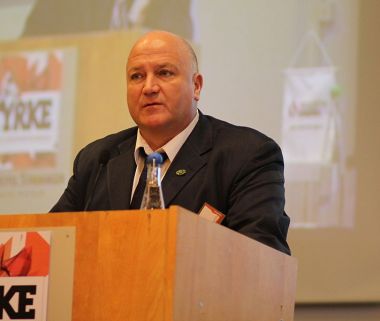Bob Crow – an old style Union boss

Bob Crow, leader of the Rail, Maritime and Transport Union between 2002 and his death at the age of 52 on 11 March 2014, pinpointed his role as a union leader in getting the best improved pay and conditions for his members that he could and taking strike action whenever he thought it appropriate.
Extracts from an interview prior to his death and published on The Independent's webpage on the day of his death, quote Mr Crow as saying: "I don't shirk from taking industrial action…Industrial action is the last resort and you don't take it lightly – but when you start you don't finish until you have won. That's what I have been brought up on."
Leaving school at 16, Mr Crow joined London Underground at a time when the trade unions enjoyed considerable power, stating that among those who had influenced his thinking included three, now deceased, trades union leaders: Jack Jones (Transport and General Workers Union), Hugh Scanlon (Amalgamated Engineering Union) and Joe Gormley (National Union of Mineworkers). Mr Crow said that he was also influenced by the fact that when he started working, it was for a nationalised industry where union membership was compulsory.
Mr Crow cited interesting heroes. Messrs Jones and Scanlon, "The Terrible Twins" of both Labour and Conservative Parties, had been Communists when younger and Oleg Gordievsky, a defector and former KGB bureau chief in London (1982-1985) claims that Mr Jones did work for the KGB.
Mr Gormley on the other hand, was much more moderate left and a very British patriot who apparently was deeply concerned at the way his Union was veering towards militancy – when he resigned in 1982, Arthur Scargill took over the role as leader of the NUM.
Mr Crow, a one-time member of the Communist Party, said that he was also an admirer of Mr Scargill and was for a short spell a member of Mr Scargill's Socialist Labour Party after leaving the Communists.
Maybe that's why Mr Crow described himself as a "Communist/Socialist", but he never followed Mr Scargill's disastrous example. The Yorkshireman, who admits to being a militant and on occasion a Stalinist, called a national miners' strike on 12 March 1984 without first going through the correct legal procedure. King Arthur's strike lasted almost a year and led to the demise of deep mining in the UK.
Mr Crow on the other hand did very well for his Union and during his tenure the basic pay for a Tube driver rose to more than £50,000 a year (plus pension and other benefits). No wonder that his union has seen a rise in membership from 57,000 to more than 80,000!
His death comes as a bit of a shock and tributes have been made by friend, foe and neutral. London Mayor Boris Johnson who crossed swords with him only last month before and during a Tube strike said: "…Obviously I didn't always agree with what he had to say… (but) together with other union members, Bob Crow unquestionably helped to drive through huge progress on London Underground, and he leaves a massive legacy behind."
Not too sure if that's the way he will be remembered by the millions of London commuters he stopped on many an occasion getting to work or the strikes he coordinated in the national rail network demanding its renationalisation.
The Labour Party expelled his Union from the Party in 2004 and he did no favours to Ken Livingstone during his tenure as Mayor of London. Not all the tributes expressed will reveal the true feelings of those being asked to comment on his passing.
Yet perhaps more tellingly, or at least it deserves airing, is part of what Nick Robinson, BBC's Political Editor had to comment: "…Behind the public displays of aggression was a man, it is widely said, who was willing and capable of striking a deal in private."
Certainly, once a bargain was struck, Bob Crow did not wiggle out from the agreement and he was probably a greater realist than first impression, a good tactician knowing just how far he could go – if only offstage – and apparently, he is credited with ensuring that much of the rolling stock on our railways is still made here in the UK, albeit by Canadian company Bombardier.
There's not likely to be another quite like him!











